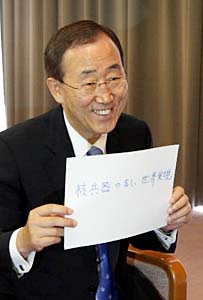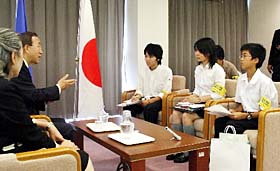A Visit to Hiroshima on August 6
Interview with UN Secretary-General Ban Ki-moon
UN Secretary-General Ban Ki-moon, 66, visited Hiroshima to attend the Peace Memorial Ceremony on August 6. The junior writers of Peace Seeds were given the opportunity to interview Mr. Ban during his time in Hiroshima and he kindly answered our questions about peace and the abolition of nuclear weapons. Below is the text of this interview.
 |
| Mr. Ban shows his message written in Japanese: "To realize a world without nuclear weapons." (Photo by Minako Iwata) |
Look beyond Japan, become a global citizen
Could you tell us the source of your strong commitment to nuclear abolition?
The United Nations works for the future of young people like you. The UN is working for peace, development, and human rights. You are the leaders of tomorrow. I am one of the leaders of today. But my responsibility is to make today more peaceful and more prosperous so you can live without any fear of nuclear weapons. I grew up in Korea. Korea is under nuclear threat from North Korea, a nuclear shadow. We were attacked by North Korea in 1950 so I know what this nuclear threat means. Now I'm working as the secretary-general for the future of all of you, for the safety and prosperity of the world. You have to carry this torch after me. That is my commitment.
What percentage would say describes peace in the world today? What do you think can be done to make the percentage 100%?
(laughs) That is quite a difficult question which I cannot answer correctly. It's very difficult to measure the level of peace in a number. But our goal is to make world peace 100%. That's what the United Nations is doing. But unfortunately there are many areas with conflicts and wars, and still there are 23,000 nuclear weapons in the world. We have to work hard, first of all, to eliminate these nuclear weapons and also to bring peace and security to all corners of the world. The UN has peacekeeping operations; like Japan, your Japanese young men and women are also participating in peacekeeping operations. If we work hard, then I think we can achieve 100% peace. I want to leave this world much more peaceful so you will be able to live in a more peaceful world.
|
Click to view the interview with Mr. Ban.
|
 |
| The junior writers ask Mr. Ban (second from the left) his thoughts on peace and nuclear abolition. (Photo by Minako Iwata) |
I understand that the UN has a variety of ethnicities and countries. What are you doing to bring harmony to the organization so everyone can work hard together?
You are right. There are 192 member states in the United Nations. They all come from different countries, different regions, they bring a different culture, different background, even different religions and different beliefs, but they are united in the pursuit of peace, and to promote mutual prosperity and development. And they are also united in protecting and promoting children's rights. But there are some differences of opinion. We need to harmoniously reconcile such differences through continuous dialogue and also through persuasion. We try to resolve all the issues in a peaceful way through dialogue. Japan plays quite an important role. Japan is the number 2 largest financial contributor and Japan also contributes many men and women for peacekeeping operations. Japan has taken a leadership role in climate change and development issues and human security issues and peace building issues. And you should be very proud of what Japan is doing in the world.
Now what I'm going to ask you, the young generation here needs to look beyond Japan. There are so many people who need your help, therefore look beyond Japan and become a global citizen.
Mr. Secretary-General, what does peace mean to you? Could you please write a response on this card?
(Mr. Ban picks up a light blue marker) This is the color of the United Nations. (Points to his necktie) It's why I chose this color necktie today. It has doves on it, too, a symbol of peace. (Writes the following message in Japanese) To realize a world without nuclear weapons.
(Masahiro Mikoshi,17, Minako Iwata,17, Seira Furukawa,16, and Masaya Obayashi,13)